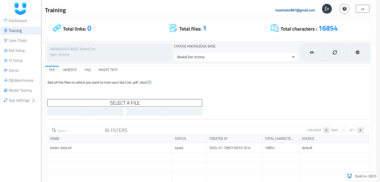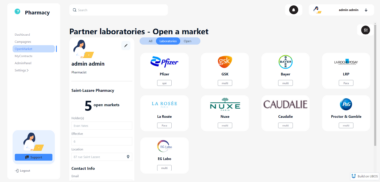MCP-CEP: Supercharging AI Agents with Location Intelligence
In today’s rapidly evolving landscape of Artificial Intelligence, the ability of AI Agents to access and interpret real-world data is paramount. Location data, in particular, offers a wealth of contextual information that can significantly enhance the performance and decision-making capabilities of these agents. This is where MCP-CEP steps in.
MCP-CEP is an innovative Model Context Protocol (MCP) server designed to provide AI Agents with seamless access to address information via CEP (Código de Endereçamento Postal, the Brazilian postal code) lookups. By leveraging the public ViaCEP API, MCP-CEP empowers AI Agents to integrate location intelligence into their operations, opening up a wide array of use cases and possibilities.
Why Location Intelligence Matters for AI Agents
Before diving into the specifics of MCP-CEP, it’s crucial to understand why location data is so valuable for AI Agents:
- Contextual Awareness: Location provides a critical layer of context for AI Agents. Knowing the location associated with a query or task allows the agent to tailor its responses and actions to the specific environment.
- Improved Decision-Making: By incorporating location data, AI Agents can make more informed decisions. For example, a logistics agent can optimize delivery routes based on real-time traffic conditions and address locations.
- Personalized Experiences: Location data enables AI Agents to deliver personalized experiences based on the user’s current location. This is particularly relevant for applications in areas like e-commerce, travel, and local services.
- Enhanced Data Enrichment: Location data can be used to enrich existing datasets with valuable geographic information. This can lead to new insights and improved analytical capabilities.
MCP-CEP: Bridging the Gap Between AI Agents and Location Data
MCP-CEP acts as a crucial bridge, standardizing how AI Agents can access and utilize location data from the ViaCEP API. This eliminates the need for AI developers to build custom integrations, saving time and resources. Key benefits of using MCP-CEP include:
- Simplified Integration: MCP-CEP provides a simple and standardized interface for AI Agents to query CEP information.
- Goose Compatibility: MCP-CEP is fully compatible with Goose, a powerful AI Agent development platform. This allows developers to seamlessly integrate location intelligence into their Goose-based agents.
- Open-Source and Customizable: MCP-CEP is an open-source project, allowing developers to customize and extend its functionality to meet their specific needs.
- Leveraging ViaCEP API: MCP-CEP utilizes the reliable and publicly available ViaCEP API, ensuring access to accurate and up-to-date address information.
Use Cases for MCP-CEP
The applications of MCP-CEP are vast and span across various industries. Here are some notable examples:
- E-commerce: Enhance customer service by providing accurate shipping estimates and delivery tracking based on CEP information. Personalize product recommendations based on the customer’s location.
- Logistics and Transportation: Optimize delivery routes, manage fleet operations, and improve overall efficiency by integrating CEP data into logistics management systems.
- Real Estate: Provide property valuations, identify investment opportunities, and enhance property search experiences by leveraging CEP-based location data.
- Customer Support: Improve customer support by quickly identifying the customer’s location and providing relevant information and assistance.
- Emergency Services: Enhance emergency response times by quickly identifying the location of the incident based on CEP information.
- Hyperlocal Marketing: Target marketing campaigns more effectively by leveraging location data derived from CEP codes. Deliver personalized ads and promotions to users in specific geographic areas.
- Data Analysis and Research: Enrich datasets with location information for spatial analysis, demographic studies, and market research.
Key Features of MCP-CEP
- CEP Lookup: Provides a simple and efficient way to retrieve address information based on a given CEP code.
- Goose Integration: Seamlessly integrates with Goose as a command-line extension, allowing AI Agents to access CEP data directly within the Goose environment.
- Customizable Timeout: Allows developers to configure the timeout for CEP lookups, ensuring that AI Agents do not get stuck waiting for responses.
- Error Handling: Implements robust error handling to gracefully handle invalid CEP codes and API errors.
- Open-Source: Released under the MIT License, allowing for free use, modification, and distribution.
Getting Started with MCP-CEP
Setting up and using MCP-CEP is straightforward. Here’s a simplified guide:
- Installation: Clone the MCP-CEP repository from GitHub and install the necessary dependencies using
uvorpip. - Configuration: Configure MCP-CEP as a command-line extension in Goose, providing the path to the MCP-CEP executable and setting the desired timeout.
- Testing: Start Goose and send commands to test the CEP lookup functionality. For example, you can use the
buscar_cepcommand to retrieve address information for a specific CEP code.
MCP-CEP and UBOS: A Powerful Combination
UBOS is a full-stack AI Agent Development Platform that empowers businesses to orchestrate AI Agents, connect them with enterprise data, build custom AI Agents with their own LLM models, and create Multi-Agent Systems. MCP-CEP seamlessly integrates with UBOS, providing AI Agents built on the UBOS platform with access to valuable location intelligence.
By combining UBOS with MCP-CEP, businesses can:
- Build Location-Aware AI Agents: Create AI Agents that can understand and respond to location-based queries and tasks.
- Enhance Data Enrichment: Enrich existing datasets within the UBOS platform with location information derived from CEP codes.
- Optimize Business Processes: Improve efficiency and decision-making by integrating location data into business workflows.
- Develop Innovative Applications: Create new and innovative applications that leverage the power of location intelligence.
The Future of AI Agents and Location Intelligence
As AI Agents become increasingly sophisticated, the demand for real-world data will continue to grow. Location data, in particular, will play a crucial role in enabling AI Agents to understand and interact with their environment. MCP-CEP represents a significant step forward in bridging the gap between AI Agents and location intelligence, empowering developers to build more intelligent, context-aware, and useful AI applications.
By leveraging the power of MCP-CEP and platforms like UBOS, businesses can unlock the full potential of AI Agents and drive innovation across a wide range of industries.
CEP Lookup Server
Project Details
- wendellbigato/mcp-cep
- MIT License
- Last Updated: 5/12/2025
Recomended MCP Servers
A MCP server that provides file conversion tools
A Model Context Protocol (MCP) server for interacting with YNAB (You Need A Budget). Provides tools for accessing...


A MCP server that lists all available MCP services for easy copying and usage
This repository contains a collection of community-maintained Model Context Protocol (MCP) servers. All servers are automatically listed on...

A Redis MCP server (pushed to https://github.com/modelcontextprotocol/servers/tree/main/src/redis) implementation for interacting with Redis databases. This server enables LLMs to...
MCP server for Nile Database - Manage and query databases, tenants, users, auth using LLMs
MCP Server for Odoo
MCP Implementation for HubSpot


 From vibe coding to vibe deployment. UBOS MCP turns ideas into infra with one message.
From vibe coding to vibe deployment. UBOS MCP turns ideas into infra with one message.






